Key takeaways:
- Editing transforms chaotic first drafts into cohesive narratives by focusing on clarity and brevity.
- Self-editing fosters personal growth and helps writers connect more effectively with their audience.
- Techniques like reading aloud, stepping away from the work, and revisiting it fresh can uncover hidden flaws and improve the writing.
- Lessons from editing emphasize the importance of structure, accepting critique, and being willing to cut unnecessary elements for stronger storytelling.
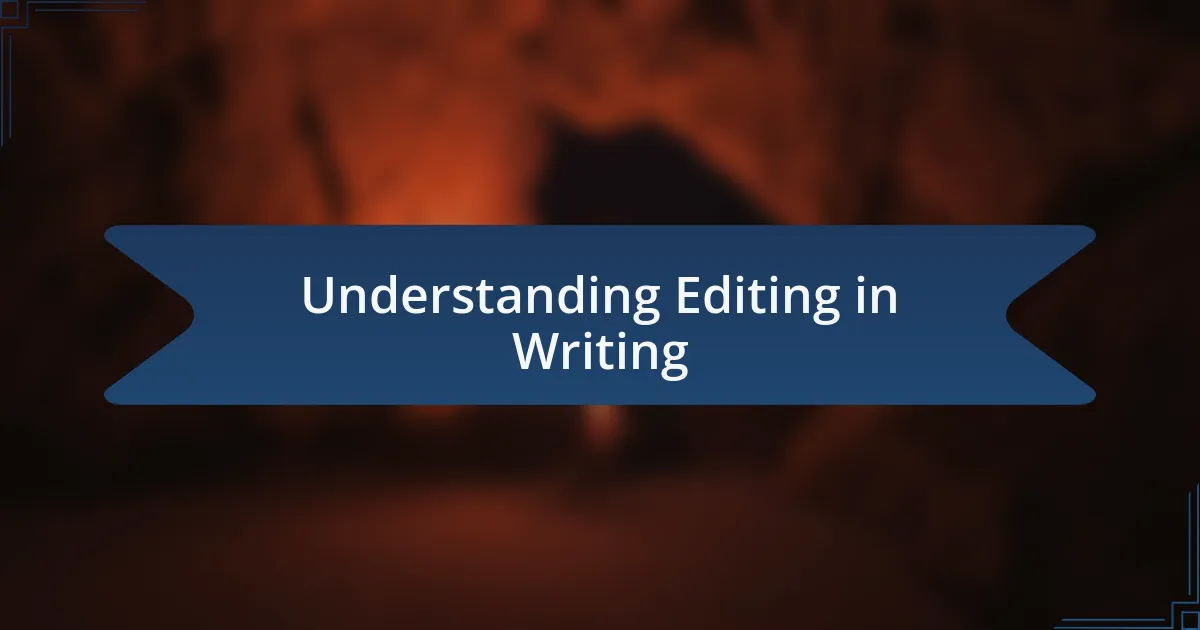
Understanding Editing in Writing
Editing is often the unsung hero of the writing process. I remember my first draft felt like a chaotic jumble of thoughts; it was only after I stepped back and revisited my words that I began to see the real story emerge. Have you ever felt overwhelmed by your own words, only to find clarity when you went through them again?
Beyond simply correcting grammar, editing is about transforming raw ideas into cohesive narratives. I once struggled to convey a character’s emotions until I realized that trimming excess words allowed me to focus on the essence of their experiences. How often do we overlook the power of brevity in our writing?
As I refined my work, I learned the importance of looking at the bigger picture. There were times when I had to let go of favorite phrases or entire paragraphs that didn’t serve the overall narrative. These moments taught me that sometimes, less truly is more. What have you discovered about your own writing through the editing process?
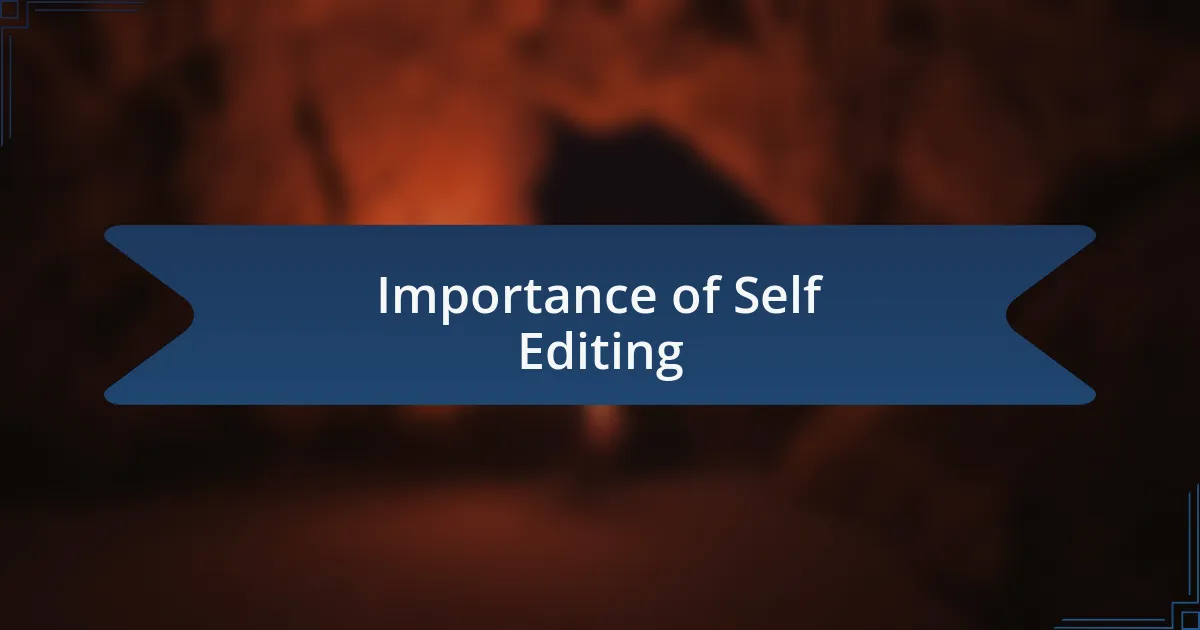
Importance of Self Editing
Self-editing is crucial as it allows us to view our work from a fresh perspective. I remember the first time I cut a whole section that I was particularly proud of, only to realize it detracted from the main theme. It was painful at first but ultimately taught me to recognize what truly matters in my writing.
Another vital aspect of self-editing is the opportunity it gives us to connect with our audience. I’ve often found that my initial drafts get caught up in my own voice rather than considering the reader’s experience. By reassessing my language and tone, I’ve discovered how to engage my readers more effectively. Have you explored how your choices resonate with your audience?
Finally, self-editing fosters personal growth as a writer. Each revision brings me closer to understanding my style and improving clarity. It’s a continuous journey of learning — how has your own editing process influenced your development as a writer?
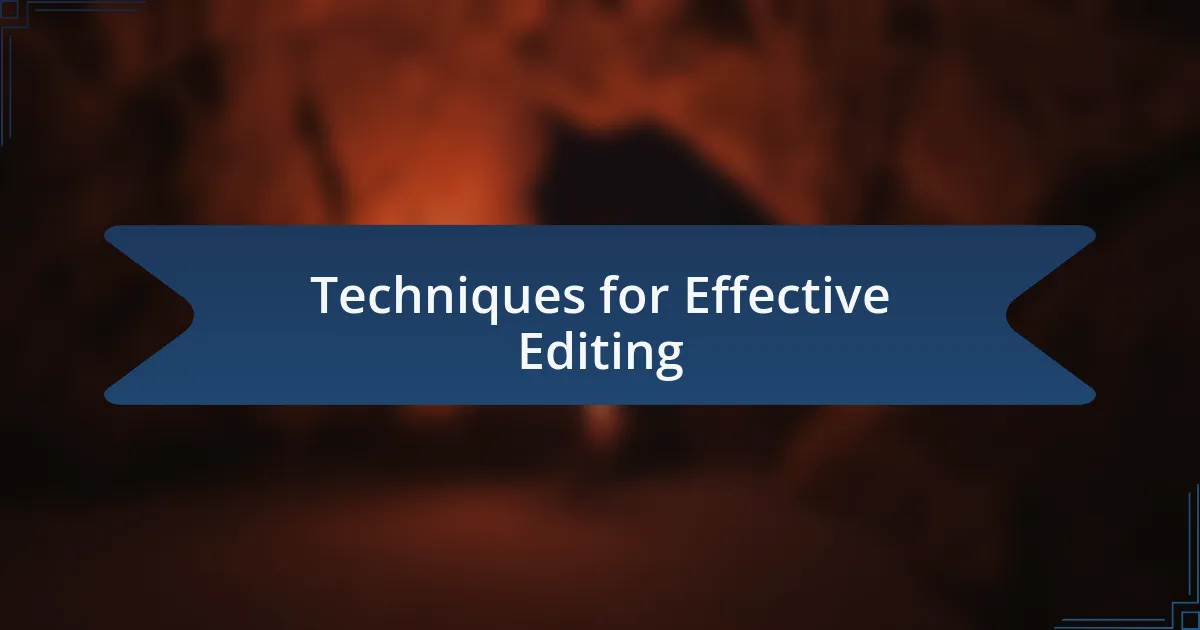
Techniques for Effective Editing
When I edit my work, one technique that’s proven invaluable is the use of a physical printout. There’s something about seeing those words on paper that makes errors pop out. I vividly recall a time I spotted typos and awkward phrases I’d completely missed on the screen. Have you ever noticed how fresh eyes can reveal hidden flaws?
Another effective method is the “read aloud” approach. I find that vocalizing my writing helps me catch the flow and rhythm of my sentences. On one occasion, I read a particularly tense paragraph aloud and realized it felt flat. Only by speaking the words did I grasp that adding a bit of excitement would draw the reader in. Have you tried this technique to uncover new layers within your prose?
Lastly, I often benefit from stepping away from my work for a day or two before revisiting it. This brief distance provides clarity and perspective that’s hard to achieve in the moment. I remember editing a piece on Agatha Christie, and after a short break, I could clearly see where I needed to tighten my arguments. Isn’t it enlightening how a little time can sharpen our focus?
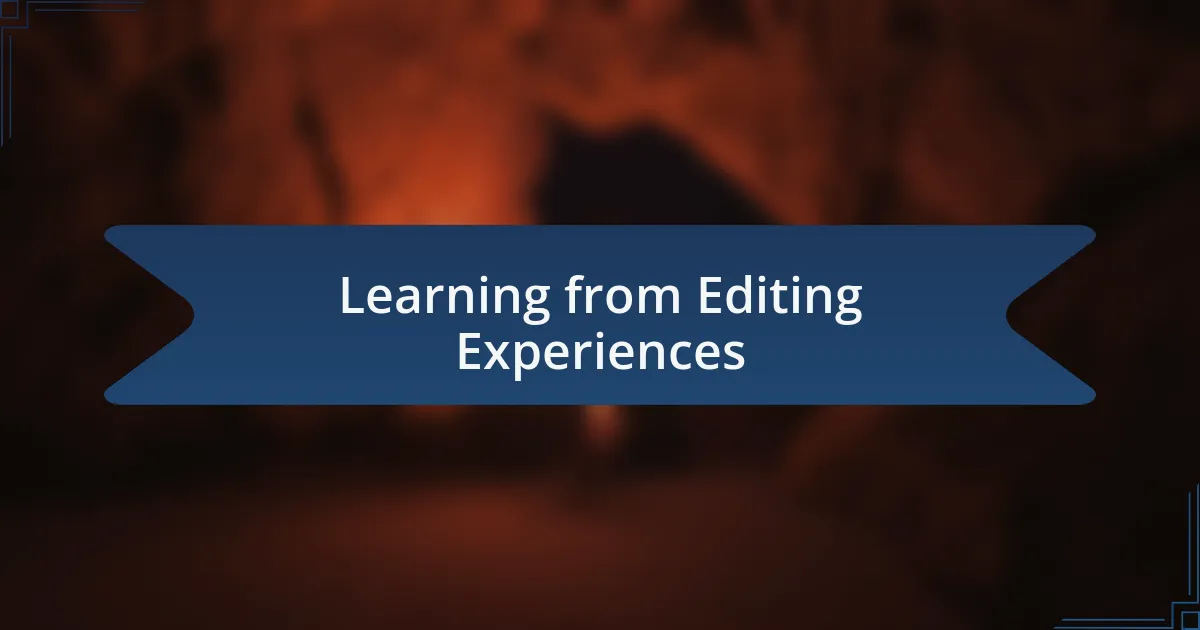
Learning from Editing Experiences
Editing experiences can be revealing in unexpected ways. I once spent hours meticulously correcting a draft, only to discover I had repeated the same phrase multiple times. This taught me the importance of looking beyond surface-level edits; I realized that repetition can dull even the best writing, and I began to appreciate how crucial clarity is to engage my audience. Have you ever stumbled upon a hidden pattern in your writing that made you rethink your approach?
Another lesson I learned came during a late-night editing session. As I combed through my manuscript, I encountered a passage that seemed emotionally charged to me but fell flat for a reader. It hit me that emotion needs to be deliberate and nuanced, not just thrown in for effect. This understanding has transformed how I craft scenes, reminding me that connecting with the reader is about making them feel rather than telling them how to feel. Have you noticed a moment in your work that changed your perspective on emotional depth?
Revisiting my work after a significant pause has been another enlightening experience. During one such instance, I opened an article I had set aside for a few weeks and found it nearly unrecognizable in its lack of focus. The clarity I gained from that time away underscored the value of revisiting our creations with fresh eyes. I now encourage myself to let my drafts breathe, allowing them to evolve in ways I might not have initially considered. Isn’t it remarkable how a little distance can shift our understanding and vision?
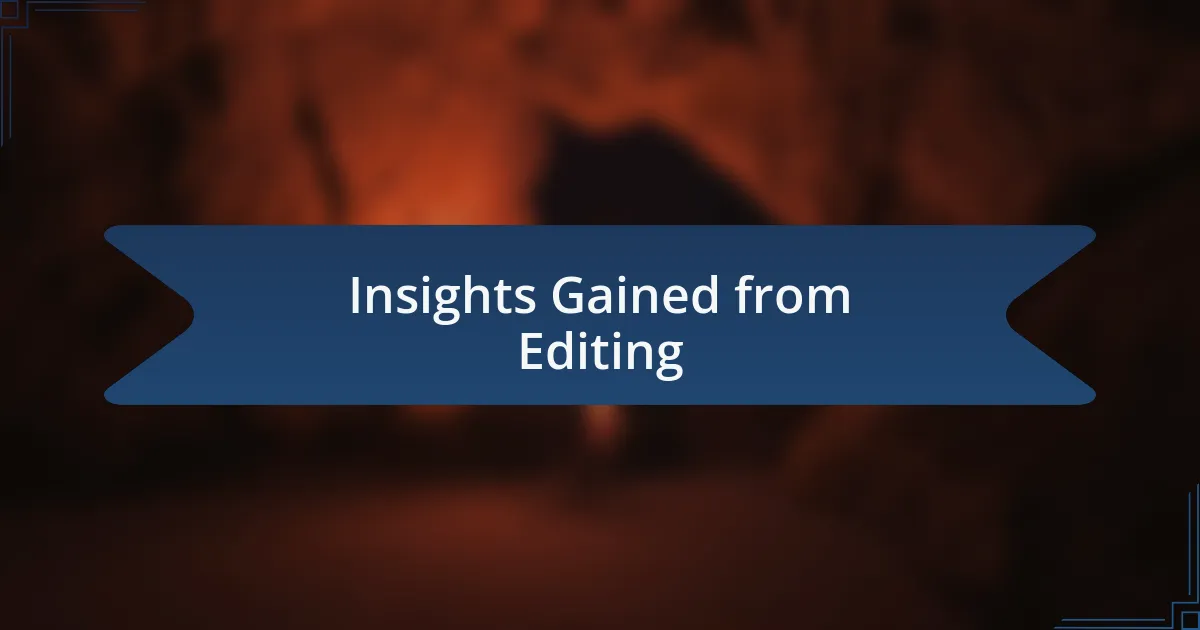
Insights Gained from Editing
Editing also highlighted the significance of structure for me. During one of my revisions, I noticed a chapter that felt cumbersome and confusing. After rearranging a few sentences, the flow drastically improved, and I realized how vital it is to guide the reader through the narrative seamlessly. Have you ever found a simple shift in structure that made your writing come alive?
Moreover, the experience of shortening my work has been profoundly enlightening. I remember truncating a lengthy paragraph that I thought was filled with vital details, only to find that the core message shone through even brighter. This reminded me that sometimes less really is more. Have you experienced the liberation that comes from tightening your prose?
Finally, I learned how challenging but rewarding it is to accept critique. Feedback from a trusted reader can initially sting, yet I found it valuable for uncovering blind spots in my writing. Embracing constructive criticism has helped me grow significantly as a writer. Isn’t it amazing how another perspective can reshape our understanding of a piece we’ve worked so hard on?
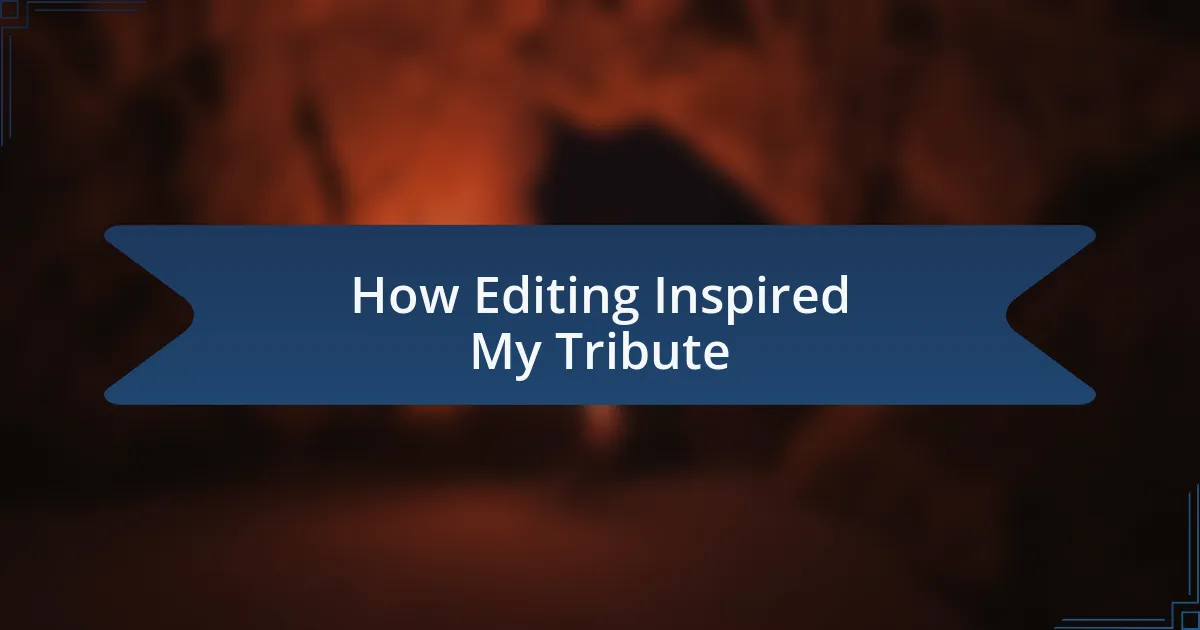
How Editing Inspired My Tribute
Editing my work became a transformative experience as I delved deeper into Agatha Christie’s themes and style. I remember pouring over a particularly dense section filled with my interpretations of her characters. As I cut unnecessary phrases, I felt like I was peeling away layers to reveal the essence of what made them so compelling. Have you ever felt a rush of clarity when simplifying your thoughts?
One specific instance that struck me was while reworking my homage to Hercule Poirot. Initially, I couldn’t quite capture his unique perspective. However, during the editing phase, I started playing with sentence lengths and punctuation. Suddenly, the rhythm of Poirot’s voice sprang to life, allowing me to embody his meticulous nature. It made me appreciate how editing could not only refine my work but also deepen my connection to the characters.
There was an exhilarating moment when I chose to remove a passage that I was attached to—a description of a setting that had taken hours to perfect. Although letting it go was tough, I soon realized it was holding the narrative back. This taught me that genuine inspiration often comes from courageously cutting away what does not serve the story. Have you ever felt that liberating challenge of prioritizing the essence of your writing?
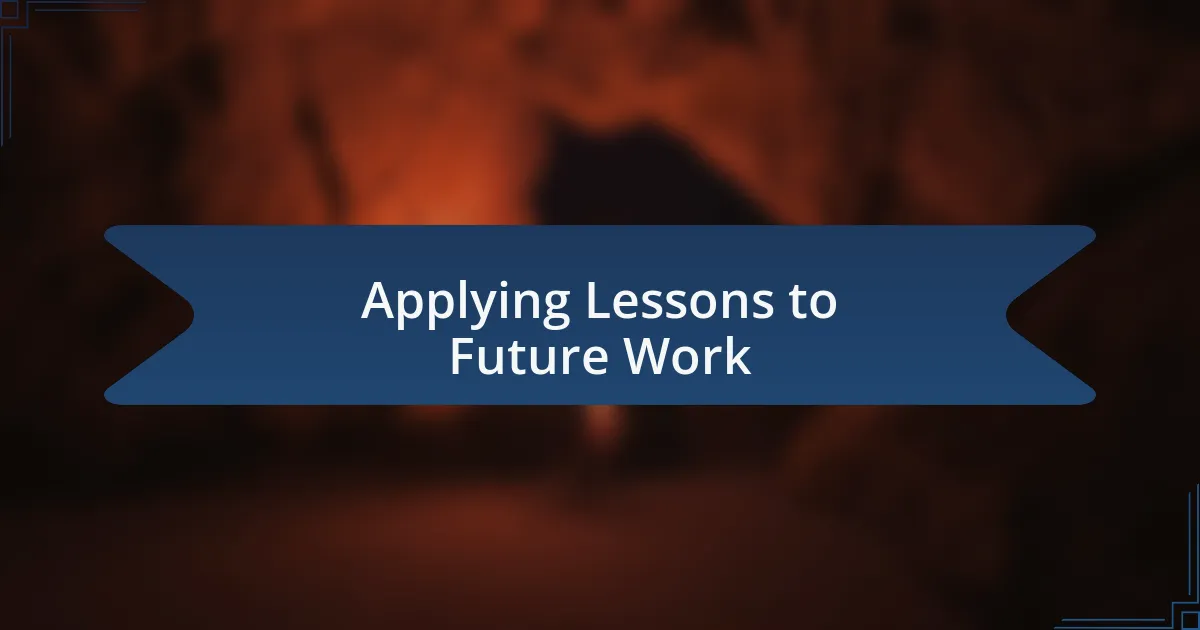
Applying Lessons to Future Work
When I look back on the editing process, I can see how some of the toughest choices became pivotal lessons for my future writing. For instance, I learned to embrace the idea of killing my darlings—a term I now approach with both trepidation and gratitude. Each time I review my drafts, I remind myself that it’s not about preserving every sentence, but rather about enhancing the overall impact. Have you ever hesitated to let go of a phrase you loved, only to later find that it clouded the clarity of your message?
During one editing session, I experimented with varying my sentence structure and pacing, which revealed new ways to convey tension and intrigue. I remember feeling excited as bursts of shorter sentences captured the urgency of a scene, while longer ones allowed for luxurious detail. This experience underscored the importance of rhythm in writing, making me keenly aware that the way I present my ideas can greatly influence how they resonate with readers. Have you noticed how a simple shift in pace can alter the tone of your writing?
Lastly, I’ve come to understand how editing offers a unique opportunity for reflection. Each round of revisions not only polishes the prose but also sharpens my insights into the narrative I’m crafting. For example, I now approach each piece with a mindset that seeks clarity and purpose, questioning how each word aligns with my overall themes. This ongoing dialogue with my work pushes me to continually evolve as a writer. Isn’t it fascinating how self-examination through editing can transform not just a piece, but also the writer’s journey?